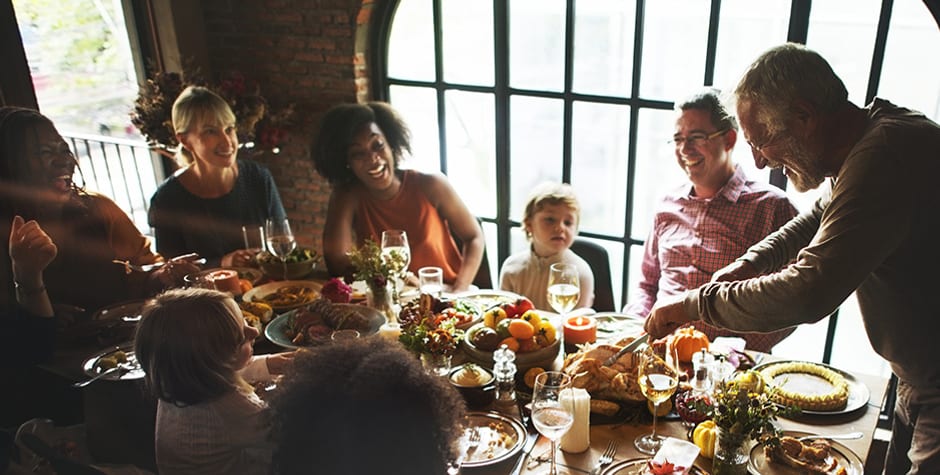Thanksgiving Day: How Gratitude Can Change America
Thanksgiving Day is a national holiday in the United States. In 1621, the Plymouth colonists and the Wampanoag native Americans shared an autumn harvest feast that is acknowledged today as one of the first Thanksgiving celebrations in the colonies.
In 1789, George Washington issued the first Thanksgiving proclamation by the national government of the United States; in it, he called upon Americans to express their gratitude for the happy conclusion to the country’s war of independence and the successful ratification of the U.S. Constitution. His successors, John Adams and James Madison, also designated days of thanks during their presidencies.
For more than two centuries, days of thanksgiving were celebrated by individual colonies and states. It wasn’t until 1863, during the turmoil and division of the Civil War, that President Abraham Lincoln proclaimed a national Thanksgiving Day to be held each November.
Today our nation is in turmoil again. It is easy to focus on cancel culture, racial strife, and the ugliness of hyperpartisan politics. Crime, riots, and acts of violence seem to be almost everywhere.
Those on the Left criticize America as being irredeemably racist. People who otherwise seek to respect the dignity and worth of every human being are pushed into their racial corners by those who promote white guilt and use the race card for their own political and financial benefit. African Americans who disagree are frequently accused of betraying their race. Racism is real. It should be roundly condemned. But when virtually everything is labeled racist, it gives true racism a pass and is unfair to those who are truly the victims of racist attitudes and actions. Martin Luther King, Jr. dreamed of a day when a person would be judged by the content of their character—not the color of their skin. Yet his dream is often betrayed under the guise of civil rights—oddly enough, often betrayed in this manner by liberal white elitists.
Others push for our nation to become more like socialist countries—even though every nation that has done so has failed in this effort, and socialist policies inevitably lead to corruption, elitism, and financial catastrophe. Socialism—by any other name—is still socialism: It involves not only government handouts, but government control. It is a disincentive to hard work, dreams, and building a better life. It is not only sharing equal wealth—but sharing equal misery.
Instead of promoting equality—something on which our nation was literally founded—the catchword today is equity. Yet equity is not the same as equality. Equality involves equal opportunity. Equity—a mistaken concept that betrays the principles of fairness and true equality and seeks to redistribute wealth and stops opportunity and upward mobility—is not the same as equality. Our Constitution, as it should, guarantees equal opportunity—not equal results.
Victimhood is in vogue. Examples of this are frivolous lawsuits, false accusations of harassment, and those who seek to excuse their own irresponsibility. Sexual harassment is real, as is gender discrimination. But, again, when these accusations are levied due to policy disagreements or hurtful speech, it is grossly unfair to those who are the true victims of harassment and discrimination. Free speech is the cornerstone of our republic. We may vehemently disagree with what someone says, but their right to say it must be protected.
These are only some of the symptoms. So, what is the cure?
As a nation, we are in need of forgiveness and gratitude. These simple things are the antidote to the issues which divide us. Let me add that individually, we need forgiveness and gratitude, too.
Forgiveness: One can be confronted—but offered forgiveness and redemption. In the past in the United States, people could disagree and yet still love and respect each other. Politicians who were polar opposites could share a meal and talk as friends. When a person erred and did wrong, a way out was provided, and they were not labeled for life. Youthful mistakes could be overlooked. A person’s worth was not connected to their political opinions or their race, religion, or sincere beliefs.
Gratitude: We have the blessing and privilege of living in the greatest nation on earth. There are reasons millions of people will pay almost any price to come to America. Are we flawless as a country? Of course not. But neither are any of us flawless personally. Simple gratitude for where we live and what we share will go a long way in fixing the ills that beset us. It is worth noting that Abraham Lincoln proclaimed a national Thanksgiving Day in the middle of a war that was literally about to tear the nation apart. Even in that situation, being thankful was appropriate and needed. Whatever we face today in the U.S. pales into insignificance compared to that.
In the Bible, we are reminded that a soft answer turns away wrath. We must be kind to ourselves—and kind to other people. We can be gracious in disagreement. The advice of the Dalai Lama is apropos: “Be kind whenever possible. It is always possible.”
This Thanksgiving Day may we show kindness, offer forgiveness, and be grateful. In spite of all that is going on, we have much for which to be truly thankful. Gratitude and forgiveness can be that which unites us—and ultimately changes America for the better.
Support the work of the ACLJ as we continue to bring you expert analysis on the issues that matter most. Have your Tax-Deductible gift DOUBLED through our Matching Challenge.

